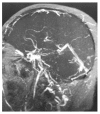Inflammatory bowel disease: an increased risk factor for neurologic complications
- PMID: 24574797
- PMCID: PMC3921505
- DOI: 10.3748/wjg.v20.i5.1228
Inflammatory bowel disease: an increased risk factor for neurologic complications
Abstract
Only a very few systematic studies have investigated the frequency of neurologic disorders in patients with Crohn's disease (CD) and ulcerative colitis (UC), which are the two main types of inflammatory bowel disease (IBD). Results have been inconsistent and variable, owing to differences in case-finding methods and evaluated outcomes in different studies. The most frequent neurologic manifestations reported in CD and UC populations are cerebrovascular disease (with either arterial or venous events), demyelinating central nervous system disease, and peripheral neuropathy (whether axonal or demyelinating); however, the literature describes numerous nervous system disorders as being associated with IBD. The pathogenesis of nervous system tissue involvement in IBD has yet to be elucidated, although it seems to be related to immune mechanisms or prothrombotic states. The recently-introduced tumor necrosis factor (TNF) inhibitors have proven successful in controlling moderate to severe IBD activity. However, severe neurologic disorders associated with TNF inhibitors have been reported, which therefore raises concerns regarding the effect of anti-TNF-α antibodies on the nervous system. Although neurological involvement associated with IBD is rarely reported, gastroenterologists should be aware of the neurologic manifestations of IBD in order to provide early treatment, which is crucial for preventing major neurologic morbidity.
Keywords: Extraintestinal manifestations; Inflammatory bowel disease; Multiple sclerosis; Neuropathy; Stroke; Tumor necrosis factor inhibitor.
Figures


References
-
- Baumgart DC, Carding SR. Inflammatory bowel disease: cause and immunobiology. Lancet. 2007;369:1627–1640. - PubMed
-
- Danese S, Fiocchi C. Ulcerative colitis. N Engl J Med. 2011;365:1713–1725. - PubMed
-
- Baumgart DC, Sandborn WJ. Crohn’s disease. Lancet. 2012;380:1590–1605. - PubMed
-
- Ordás I, Eckmann L, Talamini M, Baumgart DC, Sandborn WJ. Ulcerative colitis. Lancet. 2012;380:1606–1619. - PubMed
Publication types
MeSH terms
Substances
LinkOut - more resources
Full Text Sources
Other Literature Sources
Medical

